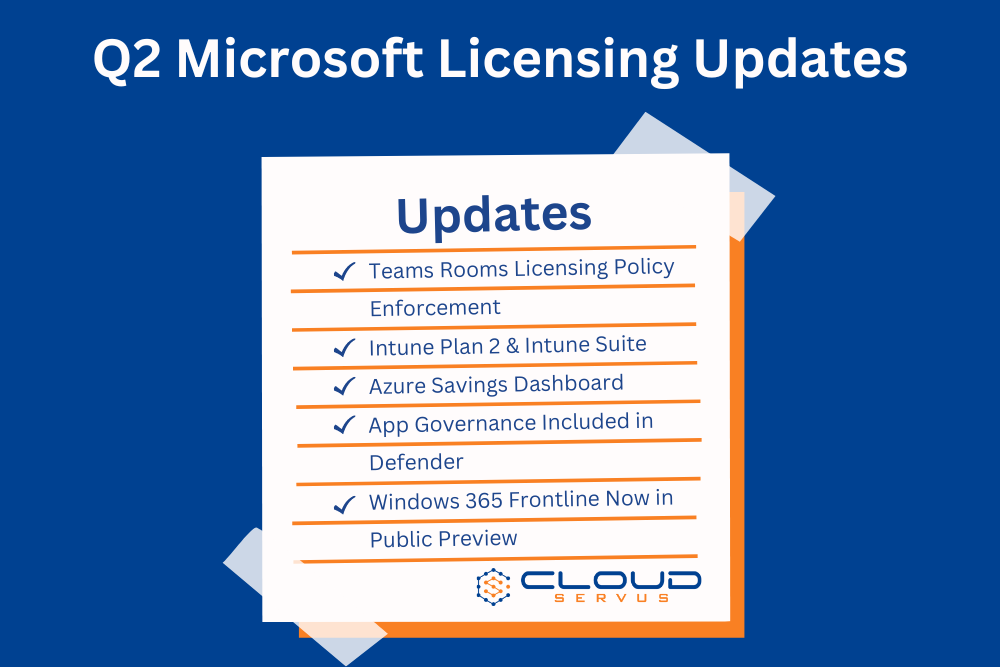Breaking Down the Latest Microsoft Licensing Updates
CloudServus aims to ensure that you stay informed about the dynamic landscape of Microsoft products and licensing. Our objective is to keep you...
3 min read
cloudservuscom Sep 26, 2023 11:10:39 AM

Cloud computing has transformed the business landscape, offering unparalleled flexibility and efficiency. A leader in this evolution is Microsoft with their service, Windows 365. This blog post will explore the benefits of Windows 365, the various versions, including an overview of the new specialized Windows 365 Frontline, and licensing prerequisites you need to be cognizant of. We'll also touch on Azure Virtual Desktop to help you understand how it compares to Windows 365, enabling you to make an informed decision as to which one will be the better choice for your organization.
Unlock the power of Windows 365, a cloud-based service designed to provide secure and easily accessible workspace solutions. It is an ideal fit for small to medium-sized businesses aiming for straightforward deployment and management of cloud-based desktops. With Windows 365, users get a dedicated Cloud PC, streamlining the onboarding process and work environment management. It also integrates robust security measures, offering high-security standards with minimal setup.
Simplicity: User-friendly setup and management make it perfect for organizations without a specialized IT team.
Scalability: While designed for small to medium-sized businesses, the Frontline version offers additional flexibility.
Cost: Fixed monthly subscription fee per user, which includes all underlying Azure resources.
Security: Built-in multi-factor authentication and encrypted data transfer to meet high-security standards.
User Experience: Consistent and secure workspace across all devices due to dedicated Cloud PCs for each user.
Key highlights: Windows 365 Enterprise caters to larger organizations seeking seamless management of their Cloud PCs through Microsoft Intune, while also benefiting from comprehensive integrations with other Microsoft services such as Microsoft Enterprise ID (formerly Azure Active Directory) and Microsoft Defender for Endpoint. There is no user cap limit on Windows 365 Enterprise. This solution offers the flexibility to leverage either on-premises or cloud-based domain controllers through Azure Active Directory Domain Join (AADJ).
Licensing requirements: Microsoft requires each user to hold licenses for Windows 11 Enterprise or Windows 10 Enterprise, as well as licenses for Intune and Microsoft Enterprise ID P1. These licenses are included in Microsoft 365 F3, Microsoft 365 E3, Microsoft 365 E5, and Microsoft 365 Business Premium, or they can be obtained separately
Key highlights: Windows 365 Business caters to smaller organizations with a maximum of 300 seats, offering a straightforward solution for purchasing, deploying, and managing Cloud PCs. This option eliminates the need for licensing prerequisites or Azure subscriptions and facilitates seamless integration with native Azure Active Directory join (AADJ).
Licensing requirements: There are no licensing requirements for Windows 365 Business however users who have devices with valid Windows 11 Pro or Windows 10 Pro licenses are eligible for a discount of up to 16% via the Windows Hybrid Benefit.
Key highlights: Microsoft recently released this specialized version of Windows 365. Windows 365 Frontline offers a more flexible and cost-efficient solution, ideal for businesses that don't require 24/7 access to a dedicated Cloud PC. It's crafted for organizations with a more elastic and distributed workforce, allowing each license to provision up to three Cloud PCs. This means that three employees can use the Cloud PCs non-concurrently but organizations need to keep in mind that they’ll need to own enough licenses for the maximum number of users that work at the same time. Each user logs in using unique credentials which ensures that every employee enjoys a personalized and familiar Windows experience every time they log in. Windows 365 Frontline is ideal for:
Part-time workers
Contingent staff
Workers on rotation schedules
Licensing requirements: Users must have licenses for Windows 11 Enterprise or Windows 10 Enterprise, Microsoft Intune, and Microsoft Entra ID P1. Intune and Microsoft Entra ID P1 are included in Microsoft 365 F3, Microsoft 365 E3, Microsoft 365 E5, and Microsoft 365 Business Premium, or they can be purchased separately.
While Windows 365 focuses on providing a user-friendly, consistent experience, Azure Virtual Desktop aims at scalability and customization. It's generally suitable for larger organizations with specific needs and in-house IT expertise. If customization and scalability are your prime focus, Azure Virtual Desktop might be worth considering.
Deciding between Windows 365 and Azure Virtual Desktop can be overwhelming. That's where CloudServus, your trusted Microsoft Solutions Partner, comes in. Our expertise in Microsoft's cloud technologies allows us to assess your needs and recommend the most suitable solution. Whether you're leaning towards the simplified yet robust features of Windows 365 or considering Azure Virtual Desktop, CloudServus is here to guide you every step of the way. Contact us today to propel your business into the cloud-based future.

CloudServus aims to ensure that you stay informed about the dynamic landscape of Microsoft products and licensing. Our objective is to keep you...

Since the beginning of their fiscal year in July, Microsoft has made several announcements. CloudServus is committed to keeping you well-informed...

Microsoft regularly unveils exciting updates and announcements, and at CloudServus, we are dedicated to keeping you informed about the continuously...